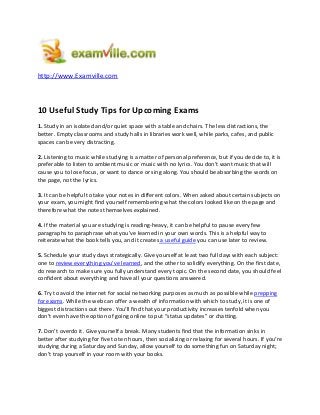
10 useful study tips for upcoming exams
- 1. http://www.Examville.com 10 Useful Study Tips for Upcoming Exams 1. Study in an isolated and/or quiet space with a table and chairs. The less distractions, the better. Empty classrooms and study halls in libraries work well, while parks, cafes, and public spaces can be very distracting. 2. Listening to music while studying is a matter of personal preference, but if you decide to, it is preferable to listen to ambient music or music with no lyrics. You don’t want music that will cause you to lose focus, or want to dance or sing along. You should be absorbing the words on the page, not the lyrics. 3. It can be helpful to take your notes in different colors. When asked about certain subjects on your exam, you might find yourself remembering what the colors looked like on the page and therefore what the notes themselves explained. 4. If the material you are studying is reading-heavy, it can be helpful to pause every few paragraphs to paraphrase what you’ve learned in your own words. This is a helpful way to reiterate what the book tells you, and it creates a useful guide you can use later to review. 5. Schedule your study days strategically. Give yourself at least two full days with each subject: one to review everything you’ve learned, and the other to solidify everything. On the first date, do research to make sure you fully understand every topic. On the second date, you should feel confident about everything and have all your questions answered. 6. Try to avoid the internet for social networking purposes as much as possible while prepping for exams. While the web can offer a wealth of information with which to study, it is one of biggest distractions out there. You’ll find that your productivity increases tenfold when you don’t even have the option of going online to put “status updates” or chatting. 7. Don’t overdo it. Give yourself a break. Many students find that the information sinks in better after studying for five to ten hours, then socializing or relaxing for several hours. If you’re studying during a Saturday and Sunday, allow yourself to do something fun on Saturday night; don’t trap yourself in your room with your books.
- 2. 8. On that note, make sure to get some sleep! Especially in the two days before the exam rolls around, it is important to give yourself seven to nine hours of sleep. This is the time when your brain recovers, after all. Your performance on exam day will significantly improve if your body is well rested. 9. Review everything with a colleague after you’ve reviewed it all yourself. It can be helpful to hear another student’s perception of the same material, and you can compare and contrast your takes on important concepts. Many students find it more helpful to study in groups only after they have reviewed the material on their own, so as not to add to the confusion. 10. Eat well for the week leading up to the exam. This will give you and your brain more energy and will fend off the likelihood of getting sick. On exam day, be sure to eat a filling breakfast with whole grains, fiber, and protein, such as eggs, oatmeal, yogurt, or a filling vegetable wrap. If you drink coffee every day, drink a normal sized cup; if you don’t, there’s no need to start now. You don’t want to be jittery during your exam. Post your responses at: http://www.examville.net/wordpress/2010/10/10-useful-study-tips- for-upcoming-exams/ Visit Examville.com for all your test preparation needs. *** Do you have an education-related article that you would like to publish on our blog? We will fully credit you if we choose to publish your writing on our blog. Email us a copy of the article to: examville (at) yahoo (dot) com. © Examville.com, LLC 2010
